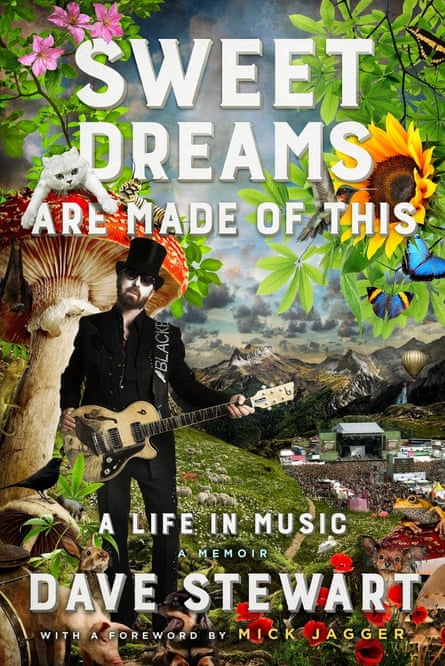In his new memoir, Sweet Dreams Are Made of This, Dave Stewart details his inebriated antics with Stevie Nicks, Tom Petty, Elton John, Bob Dylan and just about anyone else a Grammy nominating committee might care about. Yet, the star he’s most associated with – Eurythmics ally Annie Lennox – sometimes seem like a remote figure in the tome.
“I know just about every tiny molecule of Annie,” said Stewart from his home in Los Angeles. “I don’t think that should be shared with the world. If I wrote about me and Annie, it would be a completely different book.
“I can’t think of any other couple that did what we did – to break up and then start a band. Sonny and Cher did it the other way around: They were famous, then they broke up. What we went through was insane.”
In fact, the fallout from the pair’s fraught transition from lovers to band-mates lingered well after Eurythmics broke up in 1990, and has faint reverberations to this day.
“Annie’s first single, Why?, was about her relationship with me,” Stewart said.
“It was probably the first time she had a chance to sit down and say ‘what happened?’ When I first heard the song, and still when I hear it, I can hear every piece of pain that she put into it. When she sings ‘do you know how I feel?,’ it left a question. We’ve met hundreds of times since then and we never discuss our songs about each other. It’s opening up a can of worms. Who knows what will come out?”
If Stewart’s memoir steers clear of speculating on that, it charmingly deflects the issue by offering a non-stop run of sex and drug adventures, delivered in the flip tone of a seasoned raconteur.
“A lot of the things that happened weren’t funny at all,” Stewart admits. “It’s just the way you perceive it.”
To wit: in the book Stewart even manages to relay a tale of sexual abuse with a certain pluck. He recounts his encounter as a kid with a Scout leader who used to wash every member of the troop’s private parts, calling it a “hygiene test”.
“When you’re a kid you don’t know what’s going on,” Stewart said. “It didn’t seem weirdly perverse to me then – just weird.”
According to the book, Stewart began his adventures in music, sex and drugs early. As a teen in Sunderland, he saw the prog-folk band Amazing Blondel and immediately stowed away with them.
“They could have just said, ‘Kid, get a bus home,’” he said. “But they let me stay with them and showed me how you change strings on a lute.”
By 15, Stewart was dropping acid. “Everything changed at that moment,” he said. “It’s a speeded-up version of sitting on a mountain for 60 years and meditating. ‘Ah, now I get it.’ The trouble is, it doesn’t last.”
So he kept taking the drug, up to three times a week during his teen years. He was also playing in bands, with success. By 18, his band Longdancer got signed – to Elton John’s Rocket Records, no less.
“Everything smelled of fantastic cologne,” Stewart said. “There were presents everywhere and Rolls-Royces. But it was totally undisciplined. The people running his label just handed us a bundle of money. Then we’d just go and take some mescaline.”
Elton was then at his peak of excess. “He was hugely high on cocaine,” said Stewart. “It wasn’t people having a tiny bit of cocaine wrapped in paper. It was mountains of it. The conversation was very excitable.”
Understandably, Longdancer went nowhere, but soon Stewart met a young hippie woman in a health food store: Annie Lennox.
“She was more Laura Ashley dresses and longish brown hair then,” Stewart says. “When I first went to her tiny bedsit she sang a song she’d written on a harmonium. It was like, ‘Holy shit. What are you doing as a waitress? You’re an artist.’”

The two helped form the Tourists, who scored hits. But their main songwriter, Pete Coombes, was a drug addict who was derailing the band (Coombes died of drug and alcohol abuse in 1997). In the wake of the Tourists’ collapse, Stewart and Lennox, who had been lovers since that first night he heard her sing, broke up. Sort of.
“Our idea of a breakup was Annie living upstairs and me downstairs,” Stewart says. “We were still meeting for tea.”
They also started writing songs. With punk still raging in 1980, they went in a fresh direction, via a synthesiser.
“I thought, ‘If I play guitar, which I know, I’ll do something regular,” Stewart said. “But if I play this instrument, I have no idea what I’m doing.”
The duo also innovated in presentation, with Annie adopting an androgynous look.
“During the punk period, being a woman at the front wearing a skirt was pretty wild,” Stewart said. “Lots of people were leering and sexist.”
At first, everyone thought Annie was a lesbian, a trick, says Stewart, which the pair enjoyed. To up the provocation, they laid S&M imagery into their lyrics and stage outfits.
“The record company didn’t know what we were doing. But they thought, ‘They’re selling millions so they can do what they want.’”
The group took off so quickly, and sold so well, Stewart and Lennox had no time to process the change in their relationship or the pressures of success. Soon Stewart began to branch out, writing hits for other stars, which Lennox didn’t like.
“I couldn’t help it,” he says. “Annie was more reclusive and I was out in the field.”
Stewart befriended Jimmy Iovine, who connected him to a wealth of stars. Iovine was producing the band Lone Justice, when singer Maria McKee played Stewart a song the company rejected, A Good Heart. Stewart promptly produced it for Feargal Sharkey and it went to No 1.
“She was, like, ‘Bloody hell,’” Stewart recalls.
Another vexing switch happened with Tom Petty and Stevie Nicks. Stewart had written most of Don’t Come Around Here (No More) and Nicks wanted to cover it on an album that her boyfriend, Iovine, was producing.
But she was deep into drugs at the time and had trouble nailing it. So Iovine gave it to Petty who made it a smash.
Stevie “was like ‘What the fuck?’” Stewart said. “She blamed Jimmy.”
To complicate matters, Stewart reports that a coked-up Nicks invited him to her house one night, snuck into his bed and seduced him. The truth came out to Iovine, who seemed less than concerned. They all stayed friends.
The book recounts lots of other wild stories – like the time John Belushi offered Stewart and Lennox heroin by laying it out on the top of a car in broad daylight on Sunset Boulevard. (They politely declined.) Or when Stewart tried to break the ice with Daryl Hall before an album project by doing mushrooms, which made them incapable of doing anything.
Stewart also recalls when the previous head of Hertz Rent a Car, Jose Menendez, suddenly became the head of the American record company RCA. Several years later, Menendez and his wife were murdered by their two sons in a notorious case.
“I knew something was really scary and odd about him,” Stewart said.
In another chapter, Stewart recalls travelling to Mexico with Damien Hirst, Laurie Anderson and Lou Reed. A very high Hirst tried to convince a local surgeon to cut off both his hands, then reattach them, “for art”. The friends talked Hirst out of it.
Given Stewart’s reputation as an ace composer, director Paul Verhoeven asked him to compose music for the super-bomb movie Showgirls, after the earlier composer, Prince, did not work out. Verhoeven wanted Stewart to create something without seeing the script.
“I think he was doing another movie in his head,” Stewart said.
“Some people in a band that gets huge have a myopic life,” he said. “I don’t feel like that. I’m always up for another adventure.”
He’s definitely had a few.
Sweet Dreams Are Made of This is out now on NAL

Comments (…)
Sign in or create your Guardian account to join the discussion